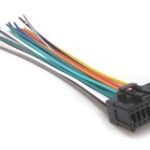Encountering a trouble code while using an OBD2 scanner can be perplexing, especially when it points to something as specific as DTC P1690: Fuel Injection Pump CKP Sensor Does Not Agree With ECM CKP Sensor. If you’re anyone in Sidney, Nebraska, or anywhere else for that matter, grappling with this code, understanding what it signifies and how to address it is crucial for maintaining your vehicle’s health and performance.
This diagnostic trouble code (DTC) P1690 essentially indicates a disagreement between the signals from two crankshaft position (CKP) sensors in your vehicle: one associated with the fuel injection pump and the other with the Engine Control Module (ECM). These sensors are vital for your engine’s timing and fuel delivery, ensuring everything runs smoothly and efficiently. When these signals don’t align, your vehicle’s computer flags it as a problem.
So, what could be causing this discrepancy and what should you do about it? Let’s break down the potential culprits behind DTC P1690:
Possible Causes of DTC P1690
Several factors can lead to this code appearing. Here’s a rundown of the most common issues:
- AC Noise Across Fuel Transfer Pump: Excessive electrical noise from the fuel transfer pump can interfere with sensor signals, causing misreadings.
- Presence of Other DTCs: Sometimes, P1690 is triggered because of other underlying issues. It’s always wise to address any other DTCs first.
- Wiring and Connector Problems: Faulty wiring, loose connections, or corrosion in the circuits related to the fuel injection pump CKP sensor or ECM can disrupt signal transmission.
- Fuel Injection Pump Static Timing: Incorrect timing of the fuel injection pump itself can lead to sensor signal disagreements.
- Fuel Sync Signal Circuit Issues: An open or short circuit in the fuel sync signal circuit can directly impact the sensor readings.
- ECM Malfunction: In less frequent cases, the ECM itself might be faulty, leading to incorrect processing of sensor data.
Troubleshooting Steps for DTC P1690
Diagnosing DTC P1690 requires a systematic approach. Here are steps you or a qualified mechanic might take to pinpoint and resolve the problem:
-
Check for AC Noise: Using a digital voltmeter (DVOM), measure for AC noise at the ECM connector terminals (specifically terminals No. 48 and 50, Red/White wires). If the AC voltage exceeds 25 mV rms, the fuel transfer pump might be the source of interference and may need replacement.
-
Scan for Additional DTCs: Use your OBD2 scanner to check for any other diagnostic trouble codes. Address any pre-existing codes before proceeding with P1690 troubleshooting.
-
Good Trip Counter Inspection: Utilize the scan tool to check the Good Trip Counter for DTC P1690. This counter helps determine if the fault is persistent or intermittent.
-
Inspect Wiring and Connectors (FPCM & ECM): Turn off the ignition and disconnect the Fuel Pump Control Module (FPCM) and ECM connectors. Look for signs of poor connection, corrosion, or damage. Test the resistance of the Dark Green wire between the FPCM (terminal No. 8) and ECM (terminal No. 18). Resistance should be less than 5 ohms. Higher resistance indicates an open circuit in the wiring.
-
Wiring and Connector Review (Continued): If the Good Trip Counter was not zero, it suggests an intermittent issue. Thoroughly inspect the wiring and connectors between the FPCM and ECM for any intermittent faults or damage.
-
Fuel Injection Pump Timing Check: Verify the fuel injection pump timing. If it’s out of specification, adjustment is necessary.
-
Isolate Short to Ground: With the ignition off and FPCM and ECM connectors disconnected, measure the resistance between ground and terminal No. 8 (Dark Green wire) on the FPCM connector. If resistance is less than 5 ohms, there’s a short to ground in the Dark Green wire. If it’s 5 ohms or greater, ECM replacement and reprogramming may be required.
Getting Help in Sidney, Nebraska
If you’re located in Sidney, Nebraska, and these steps seem daunting, or if you’ve performed these checks and are still facing DTC P1690, it’s time to seek professional assistance. A certified mechanic in Sidney, Nebraska with experience in automotive diagnostics can accurately pinpoint the root cause and perform the necessary repairs, whether it’s wiring fixes, timing adjustments, sensor replacements, or ECM related issues. Using an OBD2 scan tool is just the first step; expert knowledge is often required for a complete resolution. Don’t hesitate to reach out to local auto repair shops in Sidney to get your vehicle back in optimal running condition.
